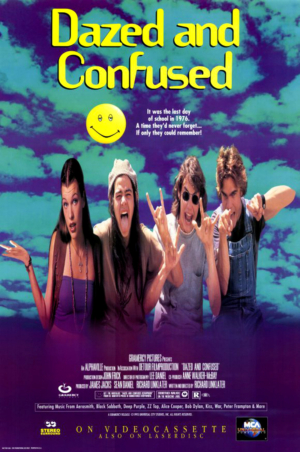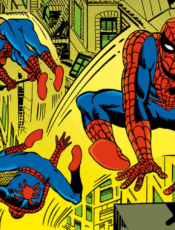Estimated reading time is 3 minutes.
HIGH SCHOOL ENDED FOR ME in 1969, but I watched my brother and sister go on for the next few years. And even then I could see that both the education they were receiving was not quite as demanding as mine had been and that the attitude of their peers was different.
More and more the kids younger than me seemed to be going to a school that would soon be perfectly captured by the stoned stupidity of the 1975 movie Dazed And Confused.
And now I have found an article titled “Four Arguments That Scream ‘Save Public Education!’” by Paul Buchheit (writing for Buzzflash at Truthout, March 31, 2014) opens with the following statement:
“The education privatizers are trying to convince us that parental ‘choice’ will solve all the problems in our schools. But the choice they have in mind is to dismantle a once-proud system of education that was nurtured and funded by a society of Americans willing to work together.”
He then provides four arguments for the necessary funding of public education for the betterment of both the American population and the American Dream. The first argument, “Equal Opportunity is an American Mandate,” states the following:
“But now, as The Economist points out, ‘Whereas most OECD countries spend more on the education of poor children than rich ones, in America the opposite is true.’ Poverty, of course, is of all colors, but it’s disproportionately black.
The Civil Rights Project at UCLA shows that segregated schools are systematically linked to unequal educational opportunities, while the Economic Policy Institute tells us that African American students are more isolated than they were 40 years ago.”
But . . .
But . . .
But this simply cannot be so! As Dinesh D’Souza has shown in his best-seller The End Of Racism (1995), racism—especially systemic racism—simply no longer exists in the US . . .
No irony on the internet
At approximately 5:00 this morning, I published the piece above as is and titled it “four arguments that scream save public education.” Then I remembered the advice of another, more experienced blogger who told me that there was a rule that all bloggers need heed: There is no room for irony on the internet.
I assured him that my readers were superior readers and would, therefore, understand the black humor in the final paragraph. That was not the problem, he said: the piece could be found by a casual reader—not a regular, registered reader—and misinterpreted, picked up and placed on another site, and I could end up accused of racism (or stupidity).
Gotcha, said I.
So at 5:30 this morning I trashed “four arguments that scream save public education.”
Then, at 6:30 later, I think to myself, why not post it with an explanation that it is an ironic piece? After all, I have addressed irony in other posts.
So, here we are with the new, improved “four arguments that scream save public education” but now titled “public education, racism, and irony on the internet” but featuring the additional commentary that you are now reading.
Now, for those readers familiar with the word irony but not truly aware of its meaning, here is Merriam-Webster’s definition of irony as the word is used here: “the use of words that mean the opposite of what you really think especially in order to be funny.”
Note that irony has other meanings, especially when used literarily: “the use of words that mean the opposite of what you really think especially in order to be funny.”
Mystically liberal Virgo enjoys long walks alone in the city at night in the rain with an umbrella and a flask of 10-year-old Laphroaig who strives to live by the maxim, “It ain’t what you know that gets you into trouble; it’s what you know that just ain’t so.
I’ve been a puppet, a pauper, a pirate, a poet, a pawn, and a college dropout (twice!). Occupationally, I have been a bartender, jewelry engraver, bouncer, landscape artist, and FEMA crew chief following the Great Flood of ’72 (and that was a job that I should never, ever have left).
I am also the final author of the original O’Sullivan Woodside price guides for record collectors and the original author of the Goldmine price guides for record collectors. As such, I was often referred to as the Price Guide Guru, and—as everyone should know—it behooves one to heed the words of a guru. (Unless, of course, you’re the Beatles.)







The typed word has no nuance, like actual verbal speech, so when irony is intended, perhaps italics, parentheses, bold, caps or quotes would work... maybe followed by a (haha) or LOL, or even (dare I say) a smiley... That way there leaves no doubt, even to the unsophisticated reader, as to the intent of the writer.
I absolutely agree with you: any of the above could tip the reader off to the use of irony. And Grommet only knows that I do normally strive for transparency and ease of understanding in my penned efforts. Normally. Any of the above also tends to take the joy of the use of irony away from the author. Plus, interesting conversations such as yours and mine would never occur . . .
Reading your post & thinking...oh my god, thats right
Do I sniff a whiff of irony in your remark?